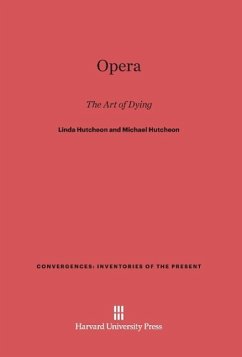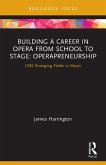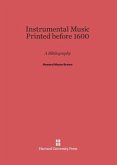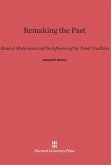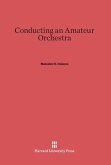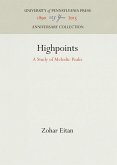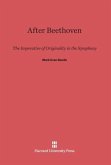Our modern narratives of science and technology can only go so far in teaching us about the death that we must all finally face. Can an act of the imagination, in the form of opera, take us the rest of the way? Might opera, an art form steeped in death, teach us how to die, as this provocative work suggests? In Opera: The Art of Dying a physician and a literary theorist bring together scientific and humanistic perspectives on the lessons on living and dying that this extravagant and seemingly artificial art imparts.
Contrasting the experience of mortality in opera to that in tragedy, the Hutcheons find a more apt analogy in the medieval custom of contemplatio mortis--a dramatized exercise in imagining one's own death that prepared one for the inevitable end and helped one enjoy the life that remained. From the perspective of a contemporary audience, they explore concepts of mortality embodied in both the common and the more obscure operatic repertoire: the terror of death (in Poulenc's Dialogues of the Carmelites); the longing for death (in Wagner's Tristan and Isolde); preparation for the good death (in Wagner's Ring of the Nibelung); and suicide (in Puccini's Madama Butterfly). In works by Janacek, Ullmann, Berg, and Britten, among others, the Hutcheons examine how death is made to feel logical and even right morally, psychologically, and artistically--how, in the art of opera, we rehearse death in order to give life meaning.
Contrasting the experience of mortality in opera to that in tragedy, the Hutcheons find a more apt analogy in the medieval custom of contemplatio mortis--a dramatized exercise in imagining one's own death that prepared one for the inevitable end and helped one enjoy the life that remained. From the perspective of a contemporary audience, they explore concepts of mortality embodied in both the common and the more obscure operatic repertoire: the terror of death (in Poulenc's Dialogues of the Carmelites); the longing for death (in Wagner's Tristan and Isolde); preparation for the good death (in Wagner's Ring of the Nibelung); and suicide (in Puccini's Madama Butterfly). In works by Janacek, Ullmann, Berg, and Britten, among others, the Hutcheons examine how death is made to feel logical and even right morally, psychologically, and artistically--how, in the art of opera, we rehearse death in order to give life meaning.
In opera, singing one's own death is a fate common to many characters. The art is one of the most death-obsessed of all Western forms, say Linda and Michael Hutcheon, authors of Opera: The Art of Dying...In it, they explore musical drama as a kind of contemplatio mortis, or contemplation of death, an extension of the medieval notion of ars moriendi, or art of dying. Operas, they argue, often portray death in positive ways that depart from traditional Aristotelian ideas of tragedy. Such images may seem counterintuitive to today's audiences, but they allow rehearsals of mortality in ways that give life meaning.
An interesting, informative, and original piece of scholarship that contributes to an ongoing reexamination of opera currently underway in a variety of academic disciplines. The book treats both highly canonical and some very esoteric operas, thus providing something of interest to the neophyte and to the more experienced.
Linda and Michael Hutcheon's Opera: The Art of Dying is a learned, absorbing, and (if one dare use this adjective for a study of death) enjoyable book. Building upon recent studies of death emanating from medicine and the social sciences, the Hutcheons demonstrate the ways that opera audiences experience the various deaths they witness onstage as a means of confronting their own mortality.
An interesting, informative, and original piece of scholarship that contributes to an ongoing reexamination of opera currently underway in a variety of academic disciplines. The book treats both highly canonical and some very esoteric operas, thus providing something of interest to the neophyte and to the more experienced.
Linda and Michael Hutcheon's Opera: The Art of Dying is a learned, absorbing, and (if one dare use this adjective for a study of death) enjoyable book. Building upon recent studies of death emanating from medicine and the social sciences, the Hutcheons demonstrate the ways that opera audiences experience the various deaths they witness onstage as a means of confronting their own mortality.

